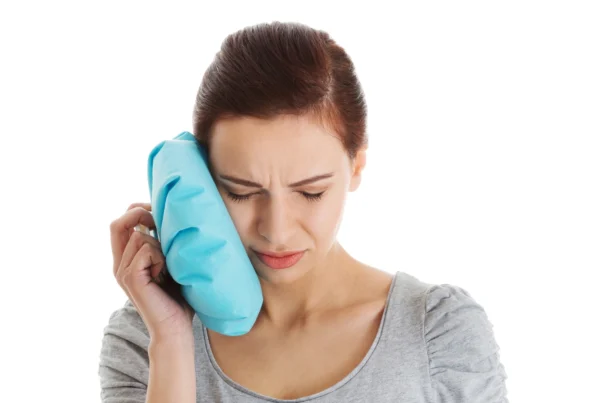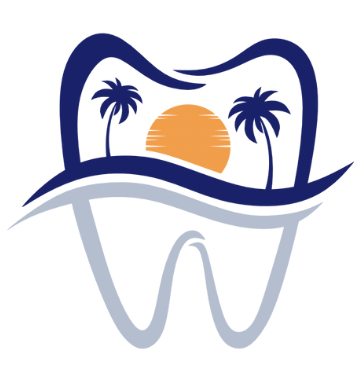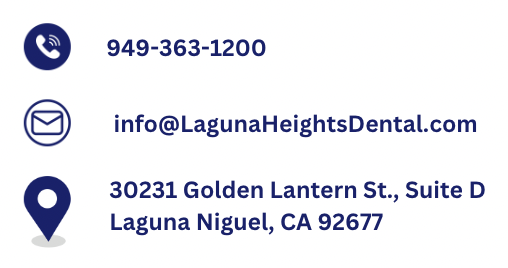“Toothaches affect millions of Americans every year—and most of them are caused by preventable issues.”
At Laguna Heights Dental, we know just how disruptive a toothache can be. Whether it hits in the middle of the night or ruins your weekend plans, that sharp, throbbing pain is impossible to ignore. The good news? There are steps you can take to relieve the discomfort—and avoid it altogether moving forward.
In this article, we’ll explore practical, dentist-approved ways to manage toothache pain at home, what causes toothaches, and when it’s time to call your local emergency dentist in Laguna Niguel.
What Causes Toothaches?
Toothaches are more than just a nuisance—they’re usually your body’s way of saying something’s wrong. The pain may be dull and constant or sharp and sudden, but either way, there’s a cause behind it. Understanding the source of your discomfort is the first step toward effective treatment.
Tooth decay is one of the most common culprits. But other causes include cracked or fractured teeth, gum disease, infected tooth roots (abscesses), and even sinus infections. If you grind or clench your teeth, that can also create pressure that feels like a toothache. Each cause requires different treatment, so a professional diagnosis is always best.
At-Home Toothache Relief Strategies
While waiting for your dental appointment, there are safe and simple ways to reduce your pain. These techniques won’t solve the underlying problem, but they can help you feel more comfortable until you’re seen.
1. Over-the-Counter Pain Medication Nonprescription medications like ibuprofen and acetaminophen can help manage inflammation and reduce discomfort. Make sure to follow the label’s dosage instructions. Avoid applying aspirin directly to the gums, as this can damage the tissue.
2. Saltwater Rinses A warm saltwater rinse is one of the easiest and most effective home remedies. Mix 1/2 teaspoon of salt into a cup of warm water and gently swish for 30 seconds. This helps clean the area, reduce swelling, and fight off bacteria that can worsen the infection.
3. Cold Compresses For swelling or jaw pain, try using a cold pack on the outside of your cheek. Apply it for 15 to 20 minutes at a time. This can help numb the area and reduce inflammation.
4. Clove Oil Application Clove oil has natural numbing properties thanks to a compound called eugenol. You can dab a small amount on a cotton swab and apply it to the affected area. Be cautious—it’s strong, so use it sparingly and avoid swallowing it.
5. Keep Your Head Elevated Pain can feel worse when lying flat. Elevate your head with an extra pillow or sleep in a slightly upright position. This reduces blood pressure in the head and may help you sleep more comfortably.
What to Avoid During a Toothache
It’s tempting to eat whatever’s easy when you’re dealing with tooth pain—but some things will only make it worse. Knowing what to avoid can prevent additional irritation.
Stay away from hot or cold drinks that could trigger sensitivity. Avoid sugary or acidic foods, which can aggravate cavities or inflamed tissues. And don’t chew on the painful side of your mouth until you’ve had the area examined.
Finally, don’t ignore the problem. Toothaches are often a symptom of something more serious. If the pain lasts more than a day or two, it’s time to call your dentist.

When to Call an Emergency Dentist
Some toothaches can be managed at home for a day or two, but others need immediate care. Delaying treatment can lead to bigger, more painful problems.
Call us at Laguna Heights Dental if you experience:
- Severe, persistent pain that interferes with eating or sleeping
- Swelling in your gums, cheek, or jaw
- A visible abscess or pimple on your gums
- Fever or chills, which may signal an infection
- Pain following an injury or trauma to your mouth
When in doubt, give us a call. We’ll help you determine whether your issue needs urgent attention.
How We Treat Toothaches at Laguna Heights Dental
Your treatment starts with a thorough exam and digital X-rays to determine the root cause. We’ll take time to explain your options and answer all your questions.
Depending on the problem, we may recommend a filling, root canal, crown, deep cleaning, or extraction. Our goal is to treat the source of your pain—not just mask it. Most importantly, we’ll make sure you leave with relief and a clear plan forward.
We also focus on comfort. If you’re anxious about dental care, let us know. We’ll take extra steps to ensure your visit is calm and reassuring.
Preventing Future Toothaches
Toothaches are often preventable with good habits and routine dental care. Brushing twice a day and flossing daily keeps plaque and bacteria in check. Fluoride toothpaste strengthens enamel and helps stop cavities before they start.
See us every six months for a cleaning and exam. We can catch early warning signs before they turn into painful problems. If you grind your teeth, ask about a nightguard—it’s a simple tool that can prevent a lot of damage.
And always listen to your body. A small ache today can become a big issue tomorrow if left untreated.
Let Us Help You Find Relief
Toothaches are tough—but you don’t have to face them alone. Whether your pain is sudden or something that’s been building, our team is here to help.
Call Laguna Heights Dental today to schedule an appointment. We’ll find the source of your discomfort, provide lasting relief, and help you protect your smile moving forward.
Schedule your consultation Today!
Laguna Heights Dental
28202 Cabot Rd, Suite 600
Laguna Niguel, CA 92677
(949) 363-1200
See More Reviews From Laguna Height Dental. View information about local places in our community. Get Driving Directions to Our Practice
Questions Patients Ask
Can tooth pain be caused by stress or anxiety?
Yes, it can. Many people clench or grind their teeth during times of stress—often without realizing it. This can lead to jaw pain, tooth sensitivity, and even cracks or fractures over time. Stress can also weaken your immune system, making it harder for your body to fight off gum inflammation or infection. If you’re noticing pain during stressful periods, talk to your dentist—we may recommend a nightguard or stress-relief strategies to help protect your smile.
Will antibiotics alone fix a tooth infection, or do I still need dental treatment?
Antibiotics can help reduce the pain and swelling from a tooth infection, but they’re not a permanent solution. The source of the infection—usually deep decay or a damaged root—still needs to be treated. Without proper dental care like a root canal or extraction, the infection will likely return. Antibiotics are often used as a short-term measure before definitive treatment.
What should I do if my child complains of a toothache at night and the office is closed?
First, stay calm and check for swelling or visible damage. Offer a dose of children’s pain reliever (like acetaminophen or ibuprofen), and apply a cold compress to the cheek if there’s swelling. A saltwater rinse can also help ease discomfort. Keep your child upright, as lying flat may worsen the pain. Then, call us first thing in the morning—we’ll make sure they’re seen quickly.
Related Articles
Emergency Dental Insurance, Emergency root canal, Emergency Extraction, Types of Dental Emergencies, Dental ER, Pediatric Dental Care, What Causes Tooth Pain, Dental Care Tips, Toothache Relief, Lost Filling or Crown





